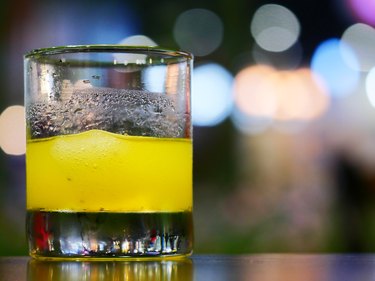
Orange juice is a breakfast staple in many homes, and people often take their daily medications at breakfast. But not all drugs mix well with all juices, according to the U.S. Food and Drug Administration. If you're taking a blood pressure drug, is it safe to take it with OJ? The answer: It depends.
In most cases, orange juice and high blood pressure medicine is a safe combination, according to Debbie Petitpain RDN, LDN, a dietitian/nutritionist in the Office of Health Promotion at the Medical University of South Carolina in Charleston and spokesperson for the Academy of Nutrition and Dietetics. Plus, diets high in fruits and vegetables can actually help lower blood pressure.
Video of the Day
Video of the Day
"One half-cup of 100 percent juice is considered one fruit serving," she says. Oranges have powerful vitamins and minerals, including vitamin C, folate and potassium, according to the U.S. Department of Agriculture.
It's important to note, however, that orange juice can interfere with the effects of some blood pressure medications. To be safe, check with your doctor before taking your blood pressure medication with a glass of orange juice.
Read more: Side Effects of Too Much Orange Juice
Diuretics, Calcium Channel Blockers and OJ
Diuretics are commonly prescribed to treat high blood pressure. They're used to flush excess water and sodium from your body through your urine. The idea is that your blood vessels won't have as much pressure on them and won't have to work as hard, explains the Blood Pressure Association in the United Kingdom.
A common type of diuretic is thiazide, the association says. Some thiazide diuretics can cause you to lose potassium along with that water and sodium. If you're taking a thiazide diuretic, you may actually want to drink orange juice with your medication because it can replace what potassium you lose, according to Winchester Hospital in Winchester, Massachusetts. Bananas are another good source of potassium, the hospital says.
Some people also are given calcium channel blockers to take with diuretics for their high blood pressure. Calcium channel blockers stop calcium from entering the muscle cells in your heart and blood vessels, the Stroke Association UK says. The effect: The arteries relax and open so blood can flow more easily.
Harvard Medical School says calcium channel blockers are safe with orange juice but may interact with grapefruit juice in a way that makes the medication more potent. If you take calcium channel blockers and drink grapefruit juice, check with your doctor about changing drugs, or switch to orange juice.
OJ and Other BP Medications
Renin inhibitors are another class of drugs sometimes prescribed to lower high blood pressure, according to Blood Pressure UK. They work by blocking the action of the enzyme renin, which triggers a process that helps regulate blood pressure.
A study published in February 2018 in the Journal of Food and Drug Analysis found that drinking orange juice could significantly reduce the concentration of the renin inhibitor aliskiren and offset the medication's benefits. The study authors recommend avoiding orange juice if you are taking aliskiren.
Other medications that may be used to lower blood pressure include ACE inhibitors. They're often given to people who have had heart attacks or who have other comorbid conditions such as diabetes, according to the Mayo Clinic. However, ACE inhibitors can lead to high potassium levels, among other side effects, it adds.
If you're taking an ACE inhibitor to control your blood pressure, talk to your doctor about whether it's safe to drink orange juice. OJ can be high in potassium, and too much potassium can lead to irregular heartbeats, the Cleveland Clinic says.
One More Thing …
Given the choice between OJ and oranges, go for oranges, Petitpain says. That way, you not only get the vitamin and mineral benefits of the fruit, but you also get good dietary fiber, too.
And a diet high in fiber, including plenty of fruits and veggies, can help reduce high blood pressure, according to the Mayo Clinic.
- U.S. Food and Drug Administration: “Grapefruit Juice and Some Drugs Don’t Mix”
- Debbie Petitpain, MS, RDN, wellness director, Sodexo, Office of Health Promotion, Medical University of South Carolina, Charleston; spokesperson, Academy of Nutrition and Dietetics
- U.S. Department of Agriculture: “Orange, Raw”
- Blood Pressure UK: “Diuretics”
- Winchester Hospital: “Thiazide Diuretics”
- Stroke Association UK: “High Blood Pressure and Stroke”
- Harvard Medical School: “Grapefruit and Medication: A Cautionary Note”
- American College of Cardiology: “Renin Inhibitors”
- Journal of Food and Drug Analysis: “Food-Drug Interactions Precipitated by Fruit Juices Other Than Grapefruit Juice: An Update Review”
- Blood Pressure UK: “Renin Inhibitors – Aliskiren"
- Cleveland Clinic: “How What You’re Eating Could Be Affecting Your Medications”
- Mayo Clinic: “Dietary Fiber: Essential for a Healthy Diet”
Is this an emergency? If you are experiencing serious medical symptoms, please see the National Library of Medicine’s list of signs you need emergency medical attention or call 911.